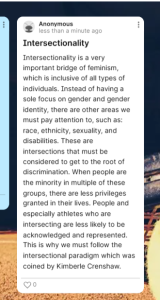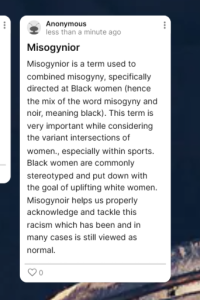3 Chapter 3 (Completed)
Padlets & Participation Screenshots:




*Rest of the screenshots for activities were not working, but padlet responses have been recorded below as well as just notebook prompts. Thanks!*
Notebook Prompts:
In about 50-70 words, consider Joel Bervell’s question: why do we feel the need to extrapolate the athleticism of one Black athlete to all Black people when we do not do the same for white athletes? Try to think of examples when this happens, making sure to reflect on your own positionality.
Personally, I think that the need to extrapolate the athleticism of one Black athlete to all Black people is very similar to how trans athletes are treated. The judgements and treatments of one Black or trans person tends to apply to all. I feel this treatment is a part of, as mentioned in this course previously, the overarching grand narrative of cis-gendered white male superiority. It seems that people in the sports field and in general tend to at times grasp to anything that can assist them in undermining anyone identifying beyond that narrow spectrum.
What are some strategies for resistance that Rajack and Joseph identify in their article as a means of pushing back against and resisting misogynoir?
Within this article, Rajack and Joseph mainly suggest utilizing self-representation as a form of resistance to colorism and misogynoir. It refers to standing up for oneself and publicly reclaiming personal identity, whether it be race, gender, sexuality, disabilities or all of the above. This method is especially effective when using Information and Communication Technologies (ICTs), like phones and social media. Employing self-representation online allows for a large mass of people to read anti-racist sentiments and in turn discourage hateful and/or ignorant behavior from continuing. This has been proven to be effective, especially when considering the experiences of Naomi Osaka. For example, when she clapped back to blatant racist comments from the comedians Aiko Kanou and Ai Murakami. Because she addressed them on social media comedically, it trumped their offensive jokes. Due to the backlash that was occuring, they were pressured into releasing an apology. It proves that advocacy online and self-representation is useful in helping put an end to racism.
What do you think? Do athletes have a responsibility to use their platform for social change? Why or why not? Please remember to record your response in both the padlet below and in your Notebook.
I think that athletes do have a responsibility to use their platforms for social change, as anyone who holds great privilege and platform do. When someone has a certain amount of status, they influence others and have a choice about what they stand for. Saying nothing is like being a bystander to discrimination and it inadvertently demonstrates that you are in support of it. In sports especially, there is a lot of room for biases to occur then go unchecked- unless someone tries to use their voice. Sports needs to be equal and that cannot be done without an unconditionally supportive team, on and off the field.
What do the authors of the article call for as a way of challenging how mainstream sports journalism privileges neoliberal feminist concerns? (50 words max)
There is a heavy emphasis on the fact that people need to work on telling stories differently. This is because stories in the mainstream media favor male voices and representation over women.
Sports leagues bear a responsibility to support social justice movements like BLM (padlet)
Yes, they do. Otherwise, if a league isn’t openly in support of BIPOC or 2SLGBTQIA+ individuals, they are not trying to create a safe space for all. I think due to the stigmas in sports, there may be embarrassment to associate with queer people in particular. This is exactly why I feel sports leagues must take a stand, to help normalize queer athletes and take pride in supporting them. If this can be normalized, stigmas and barriers can lessen over time. Hopefully this would lead to a shift in the predominant opinions of sports fans and in turn, society as well.
In your Notebook, analyze the representation of a racialized athlete activist in a show (television or film or novel) of your choosing. What strategies do athletes employ to speak out? What is the commentary on athletes using their voices in these shows? How do race and/or gender or other *identities inform this representation? How do these representations shape how we understand the sports themselves? Responses should be approximately 300 words, use specific examples from the selected cultural text (some examples below), and engage with one of the readings from this week (at least twice). Worth: 5% (in addition to the module grade of 5%).
I will preface first and foremost that I do not watch shows or movies that are about sports since they do not particularly interest me, so my selection is very scarce for this assignment. The only movies I’ve seen which I can think of with racialized athletes who were activists at times is Chad Danforth and Zeke Baylor from the High School Musical trilogy. In the first movie there is a song called Stick to the Status Quo, where Zeke begins by singing in the cafeteria. He drops his basketball and confesses his real passion is baking. Zeke initially felt embarrassed, because it is a ‘feminine’ hobby. Because of his vulnerability in being authentic, the song continues with other students feeling comfortable enough to share their truths because of him. This movie premiered in 2006 before the social media boom, but I feel Zeke would follow in the foot steps of LeBron James and be vocal online about social justice. Especially on the topic of breaking away from the conditioning of gender norms.
As for Chad, he did not begin as an activist, but rather the opposite. In the first film he looks down on men for being interested in singing, dancing or theatre. Especially in regards to his teammates on the basketball team who are held to a higher standard of ‘masculinity’. He initially had a “shut up and dribble” mindset which athletes like LeBron are expected to follow, rather than advocate for others (Galily). In this case, Chad was stuck in a discriminatory mindset that did not only harm others, but himself as well. He had a hidden talent for the arts but was forced onto a path that was already paved for him by societal expectations for Black men. This is was engrained deeply within him which perhaps why it wasn’t until the third movie that he partook in musical theatre and supported his friends decisions. He sang a song I Don’t Dance, which demonstrated how he was fighting the urges of his natural singing and dancing talents because of scrutiny that could arise from gender norms.
Over all, I think Chad and Zeke portray two potential outcomes from the same type of conditioning. I think Zeke reflects the actions that LeBron would take and Chad represents the men who have not opened their minds to newfound perspectives or empathy (i.e. those who say “shut up and dribble”). Zeke was a true advocate because he took a stand in a crowded place and while you could see his embarrassment, he was brave in being honest about something he could be teased for. Meanwhile, Chad had to make a breakthrough in becoming more open-minded before even supporting his friends, let alone becoming an outspoken advocate. These movies portrayed stereotypical gender norms in a way that made them seem silly and unimportant when it comes to achieving personal happiness. These movies greatly fueled my outlooks on gender and equality in a positive way during my childhood!
Works Cited
Galily, Yair. “‘Shut up and dribble!’?athletes activism in the age of twittersphere: The case of Lebron James.” Technology in Society, vol. 58, Aug. 2019, p. 101109, https://doi.org/10.1016/j.techsoc.2019.01.002.
Media Attributions
- Screenshot 2025-02-25 171351
- Screenshot 2025-02-25 170732
- Screenshot 2025-02-26 111652
- Screenshot 2025-02-26 121249
